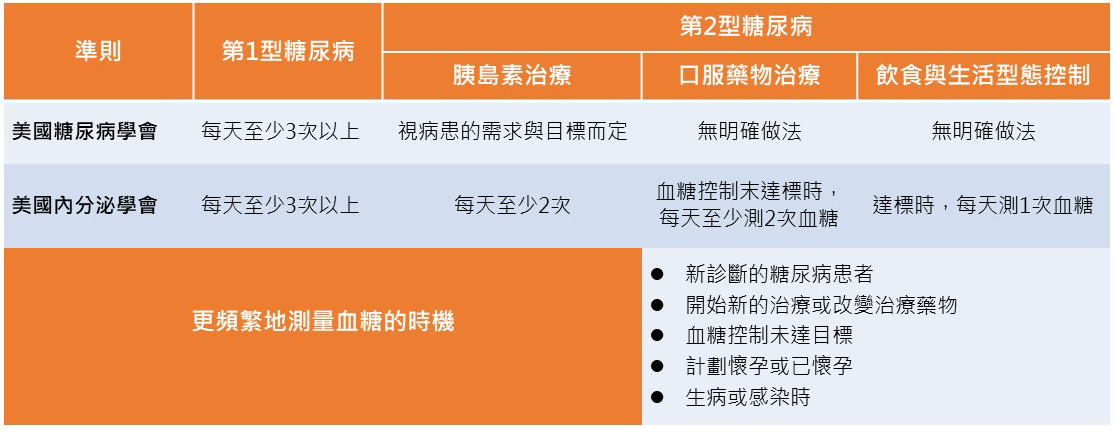11.2023 Life Guide
Smart sugar control starts with self monitoring of blood sugar levels
Dr. Zhang Jinhuan, Department of Metabolism, Far Eastern Memorial Hospital /


 The American Family Medicine Association recommends that all patients with diabetes should have their own blood glucose machine. Through self blood glucose monitoring, they should always master the effects of diet, physical activity and drugs on blood glucose, and control blood glucose steadily. However, many sugar enthusiasts, due to factors such as fear of pain, trouble, lack of time, and expensive blood sugar test strips, have some resistance to this, or only regularly test the blood sugar of a certain meal. They even believe that since blood has been drawn every three months to test for glycosylated hemoglobin (HbA1C), blood sugar monitoring is no longer necessary. Little does it know that mastering the knowledge and methods of blood sugar testing correctly can improve the situation of poor blood sugar control.
The American Family Medicine Association recommends that all patients with diabetes should have their own blood glucose machine. Through self blood glucose monitoring, they should always master the effects of diet, physical activity and drugs on blood glucose, and control blood glucose steadily. However, many sugar enthusiasts, due to factors such as fear of pain, trouble, lack of time, and expensive blood sugar test strips, have some resistance to this, or only regularly test the blood sugar of a certain meal. They even believe that since blood has been drawn every three months to test for glycosylated hemoglobin (HbA1C), blood sugar monitoring is no longer necessary. Little does it know that mastering the knowledge and methods of blood sugar testing correctly can improve the situation of poor blood sugar control. What is glycosylated hemoglobin (HbA1C)? Can it replace self blood glucose monitoring?
What is glycosylated hemoglobin (HbA1C)? Can it replace self blood glucose monitoring?When glucose in the blood adheres to the heme component of red blood cells, it undergoes glycosylation, known as "glycosylated hemoglobin (HbA1c)". If blood sugar is higher, the more glycosylation occurs, and the higher the concentration of glycosylated hemoglobin.
The lifespan of red blood cells is 90-120 days, so the value of glycated hemoglobin mainly reflects the average blood sugar level of the body over the past 3 months. It is one of the indicators commonly used in clinical practice to track patients' blood sugar control status, but it cannot display blood sugar fluctuations or the occurrence of high and low blood sugar levels. In fact, the same glycosylated hemoglobin will also have different blood sugar changes, and the excessive fluctuation of blood sugar is one of the reasons for the complications of diabetes, so it is very important to monitor blood sugar regularly.
Blood glucose control goals for adults with diabetes
According to the recommendations of the diabetes Society of the Republic of China in 2022, the goals for adult diabetes patients to control blood sugar include: blood sugar before meals 80~130mg/dl, blood sugar after meals 80~160mg/dl, and glycosylated hemoglobin should be less than 7.0%. At the same time, we should consider the patient's age, the risk of hypoglycemia, the duration of diabetes, and the severity of comorbidity, and set individual blood glucose control goals.
In recent years, the medical community has actively advocated the concept of "Choosing Wisely", hoping that everyone can choose the correct examination or treatment that is helpful for disease diagnosis and treatment, and reduce the waste of inefficient or ineffective medical resources. Therefore, regarding self-monitoring of blood sugar, patients should carefully consider: do they need to self-monitor blood sugar? What benefits can it bring? What are the risks? Is there any other simpler and safer way? What will be the consequences if I don't do it? How much does it cost? After obtaining relevant information, decide on the disposal method.
The significance of self blood glucose monitoring
Each measured blood sugar value has its own meaning. Doctors can adjust or evaluate the effect of treatment according to the blood sugar value (such as diet, exercise, insulin, anti diabetes drugs, stress management, etc.). Patients can also learn which foods will cause blood sugar to rise, and observe the changes in blood sugar values after eating, walking, doing housework, sitting with full stomach, watching TV, skating, and by modifying lifestyle and adjusting drugs, Keep blood sugar as close as possible to the target value.
Timing of self blood glucose monitoring
The American diabetes Association (ADA) recommends that the timing of self blood glucose monitoring include: "insulin use", "fasting state", "before exercise", "when hypoglycemia is suspected", "the process of treating hypoglycemia (until the blood glucose is normal)", and "before and during driving/performing key tasks".
Self blood glucose monitoring time and frequency
The operation time and frequency of self blood glucose monitoring vary from person to person, mainly depending on the type of diabetes, treatment prescription, hypoglycemia risk, and whether the blood glucose control is up to standard.
(Source: 2020 diabetes Health Education Core Textbook)
However, if patients only monitor their blood sugar without taking any action, they still cannot generate benefits and must take corresponding measures based on their blood sugar levels. For example, if the blood sugar rises to 300mg/dL after meals, it is necessary to check whether the warning food has been ingested by mistake to avoid consuming similar foods next time; If blood sugar is too low, it is necessary to eat as soon as possible to identify the cause and correct it. In addition, all blood sugar values must be recorded in order to discuss with the medical team whether adjustments to medication, diet, and lifestyle are necessary. This way, blood sugar can be better controlled and the body will be healthier and more energetic.
Precautions for self blood glucose monitoring
If the human operation is improper, the blood collection amount is too much or insufficient, or even the test paper is expired, damp, or contaminated with alcohol, it may affect the accuracy of blood sugar values. Therefore, it is recommended that everyone practice repeatedly, wash their hands frequently, disinfect with alcohol, and use a new blood collection needle every time the test is conducted to prevent infection.
conclusion
Diabetes is a very complicated chronic disease. The only way to delay and avoid complications is to control diet, exercise moderately, combine drug treatment, do a good job in self blood glucose monitoring, manage blood glucose, and regularly track and accept complications screening.
*Dr. Zhang Jinhuan's expertise includes: diabetes and related complications, hyperlipidemia, abnormal uric acid metabolism, thyroid diseases, parathyroid diseases, adrenal diseases, pituitary diseases, etc. https://www.femh.org.tw/section/sectionDetail2?CID=0203&&DoctorID=91074
#




















